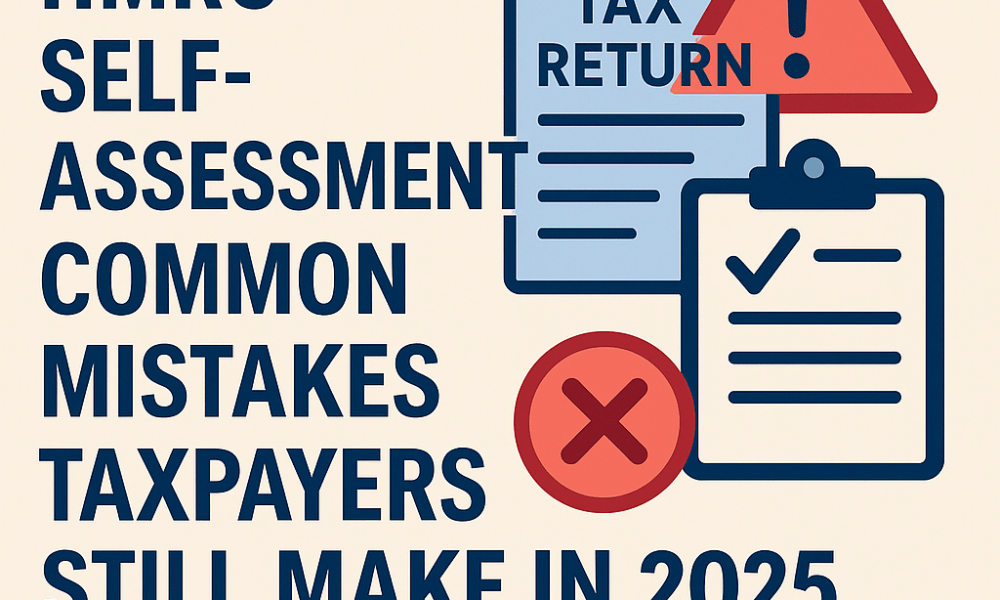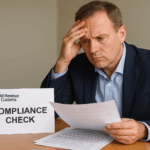HMRC Self-Assessment: Common Mistakes Taxpayers Still Make in 2025
Submitting your tax return remains a challenge for millions of UK taxpayers. Even with improved digital tools and clearer HMRC guidance, common errors still lead to penalties, delays, and incorrect tax bills. Whether you’re self-employed, renting out property, freelance on the side, or managing multiple income sources, knowing the latest 2025 mistakes — and how to avoid them — is essential.
What Is HMRC Self-Assessment in 2025?
HMRC Self-Assessment is the UK system for reporting income not automatically taxed through PAYE, such as self-employment, rentals, dividends, or foreign income. In 2025, enhanced digital reporting and stricter verification checks mean accurate record-keeping, correct income reporting, and timely filing are more important than ever.
Who Must File a Self-Assessment Tax Return in 2025?
You must file in 2025 if you:
- Earn over £1,000 from self-employment
- Receive rental income
- Have untaxed savings or investment income
- Earn over £100,000 through PAYE employment
- Make income from abroad or overseas assets
- Have capital gains to report
- Receive dividends above the allowance
- Earn platform income (e.g., Etsy, Airbnb, delivery apps) exceeding reporting thresholds
Common HMRC Self-Assessment Mistakes in 2025
1. Missing the Filing Deadline
2025/26 deadlines:
- 31 October 2025 — Paper returns
- 31 January 2026 — Online returns
Even if no tax is owed, HMRC issues an automatic £100 penalty when you miss the deadline.
2. Misunderstanding Updated Penalty Rules
In 2025, late filing penalties apply immediately after the deadline. Additional charges apply at 3, 6, and 12 months. Interest accrues daily until the return is submitted and paid.
3. Incorrect Income Reporting
One of the most common mistakes is failing to report all income streams, especially:
- Etsy or online shop sales
- Gig-economy income
- Influencer/affiliate earnings
- Airbnb or short-term rentals
- Tutoring, coaching, or course sales
- Digital content monetisation
Platforms now report seller income directly to HMRC — making omissions risky.
4. Not Claiming Allowances and Deductions
Many taxpayers still miss legitimate tax reliefs available in 2025.
Commonly Missed Reliefs (2025)
- Home office expenses
- Business travel & mileage
- Pension contributions
- Professional subscriptions
- Charitable donations
- Capital allowances on equipment
Not claiming these often leads to overpaying tax.
5. Poor Digital Record-Keeping
With expanded Making Tax Digital (MTD) requirements, HMRC expects cleaner digital records. Manual spreadsheets, inconsistent receipts, and lost invoices remain major causes of errors.
Digital Tax Changes You Must Know in 2025
Making Tax Digital (MTD) Requirements
From April 2026, MTD for Income Tax becomes mandatory for self-employed workers and landlords earning over £50,000, with additional thresholds rolling out in 2027 and 2028. In 2025, taxpayers should actively migrate to MTD-compatible software to avoid compliance issues.
HMRC’s Strengthened Verification Checks
In 2025, HMRC continues expanding identity and fraud-prevention measures, including:
- Two-factor authentication
- Verified ID apps
- Biometric checks
- Platform-reported income matching
Verification delays are now a common reason refunds are held up.
How to Avoid HMRC Self-Assessment Mistakes in 2025
Use HMRC-Compatible Digital Tools
Digital software can assist with:
- Automatic income tracking
- Expense categorisation
- MTD compliance
- Deadline reminders
- Error checking
Hire a Certified Accountant (Where Needed)
This is especially useful if you:
- Have multiple income streams
- Earn foreign income
- Rent multiple properties
- Are new to self-employment
A professional can help minimise tax liability and prevent penalties.
Common Questions About HMRC Self-Assessment
1. What happens if I miss the 2025/26 filing deadline?
You will receive an immediate £100 penalty, and further penalties apply the longer you delay.
2. Do I need to file if I earn under £1,000?
Not usually, unless you have additional taxable income or need to claim expenses/losses.
3. Are side-hustle earnings taxable in 2025?
Yes. Side-hustle income above the £1,000 trading allowance must be reported.
4. What software do I need for Making Tax Digital?
You must use MTD-compatible software approved by HMRC.
5. Will HMRC penalise accidental mistakes?
Yes — careless or inaccurate filings can trigger penalties, even without intent.
6. How long must I keep tax records in 2025?
You must retain digital records for at least 5 years after submitting the return.
Key Self-Assessment Deadlines & Penalties (2025/26)
| Category | Details |
|---|---|
| Paper Filing Deadline | 31 October 2025 |
| Online Filing Deadline | 31 January 2026 |
| Immediate Penalty | £100 |
| 3-Month Penalty | Daily fines may apply |
| Record-Keeping Requirement | Minimum 5 years |
| MTD Threshold from Apr 2026 | £50,000+ income |
Conclusion
Understanding the most common HMRC Self-Assessment mistakes in 2025 — especially with new digital reporting, tighter verification and platform-reported income — is essential for maintaining compliance and avoiding penalties. By using modern software, keeping strong digital records and seeking expert help where needed, you can file your return accurately and confidently.






